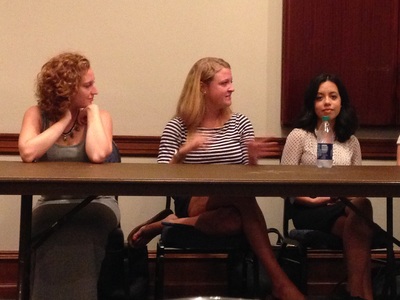By Dakota Jones, C '19
View photos from the event here, and the DP article here.
On Tuesday night, the Penn Government and Politics Association invited former Senator Mark Pryor (D-AR) to speak at Penn. 140 students came to hear the Pryor speak about his experiences as a Southern Democrat; he fielded a multitude of questions about how to fix the American political system, the Democratic Party, and his experiences in the U.S. Senate.
Throughout the session, Pryor repeatedly spoke about the problems that are associated with money and politics. During his initial presentation, he presented a chart of all the different organizations that wealthy donors such as the Koch brothers used to fund candidates during the 2014 election. Pryor stated that there is “so much money out there floating through organizations that voters have no clue about.”
Pryor also touched on the problems associated with political polarization throughout the session as well. He strongly asserted that the nation is currently too polarized to function, specifically noting that many legislators are afraid that bipartisanship could cost them their jobs. According to Pryor, “The Senate is broken, and the American people know it.”
Overall, I believe that the event was a rousing success because it gave me a chance to hear from a type of politician (a Southern Democrat) that I would never encounter in my home state of Alaska. It was definitely exciting to see him speak at Penn.
View photos from the event here, and the DP article here.
On Tuesday night, the Penn Government and Politics Association invited former Senator Mark Pryor (D-AR) to speak at Penn. 140 students came to hear the Pryor speak about his experiences as a Southern Democrat; he fielded a multitude of questions about how to fix the American political system, the Democratic Party, and his experiences in the U.S. Senate.
Throughout the session, Pryor repeatedly spoke about the problems that are associated with money and politics. During his initial presentation, he presented a chart of all the different organizations that wealthy donors such as the Koch brothers used to fund candidates during the 2014 election. Pryor stated that there is “so much money out there floating through organizations that voters have no clue about.”
Pryor also touched on the problems associated with political polarization throughout the session as well. He strongly asserted that the nation is currently too polarized to function, specifically noting that many legislators are afraid that bipartisanship could cost them their jobs. According to Pryor, “The Senate is broken, and the American people know it.”
Overall, I believe that the event was a rousing success because it gave me a chance to hear from a type of politician (a Southern Democrat) that I would never encounter in my home state of Alaska. It was definitely exciting to see him speak at Penn.




 RSS Feed
RSS Feed
